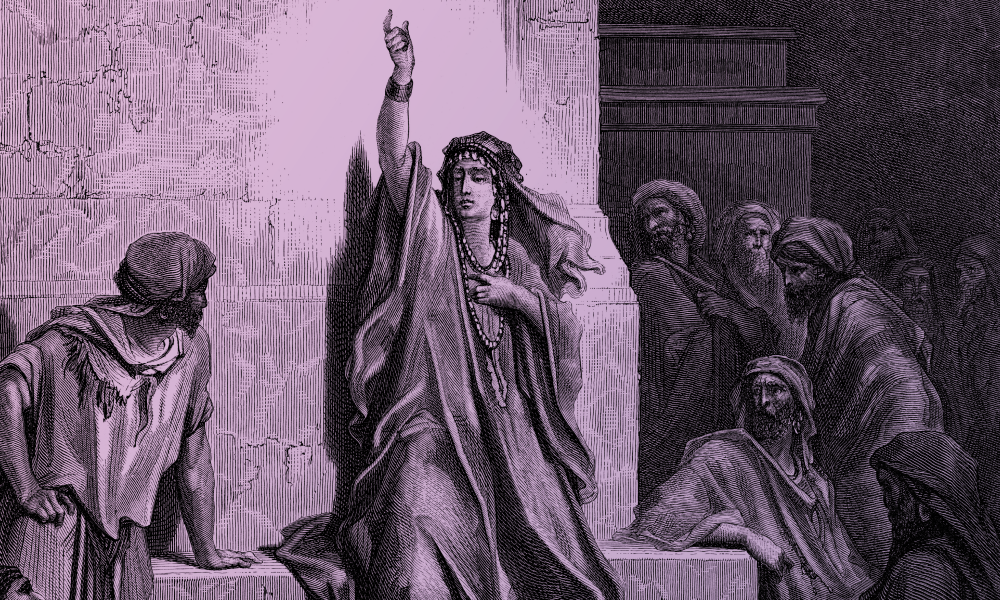
Women in the Bible
Deborah: Old Testament prophetess and judge
Deborah: Old Testament prophetess and judge
Gone was freedom beyond the walls, gone indeed from Israel. When I, Deborah, arose, when I arose, a mother of Israel. – Jgs 5:7
The passage above is taken from the Song of Deborah in the Book of Judges. It pays homage to Deborah (or Debbora), who was a prophetess and judge of Israel. Throughout the sacred Scriptures, we are constantly reminded that faithfulness and obedience to God’s word are the essential ingredients to salvation, both on a personal and corporate level. Deborah’s story provides witness to this fundamental truth.
Gone was freedom beyond the walls, gone indeed from Israel. When I, Deborah, arose, when I arose, a mother of Israel. – Jgs 5:7
The passage above is taken from the Song of Deborah in the Book of Judges. It pays homage to Deborah (or Debbora), who was a prophetess and judge of Israel. Throughout the sacred Scriptures, we are constantly reminded that faithfulness and obedience to God’s word are the essential ingredients to salvation, both on a personal and corporate level. Deborah’s story provides witness to this fundamental truth.
The judges
When we think of a judge, we usually picture an official of the court in a long black robe. However, in the Bible, the judges were the leaders of Israel who shepherded the nation from the end of the Canaanite conquest until Samuel’s (the last judge) anointing of Saul as Israel’s first king. Generally, a judge’s authority was limited to one tribe or group of tribes rather than the entire nation of Israel.
The period covered in the Book of Judges consisted largely of the familiar cycle of Israel’s infidelity to God, oppression by foreign powers, Israel’s crying out to God and God’s deliverance of Israel. The Book of Judges relates the stories of 13 judges during this time. Six judges are considered major because of the space dedicated to them in the Book of Judges. One of these major judges was Deborah, who is the only female judge mentioned in the Bible.
The prophetess and judge
Deborah was both a prophetess and a judge. The wife of Lappidoth, her prophetic gifts led to her being venerated by the Israelites, who granted her authority over them. In particular, she was known for her wisdom in settling legal disputes much like our present-day judges, as the judges would administer justice during times of peace. She famously held court under a palm tree. Perhaps it was the confidence she inspired in the people when dealing with these types of matters that positioned her to effectively assume the role of leader and deliverer of the nation in the face of oppression by a foreign power.
The military leader
Deborah had grown to resent the Canaanite oppression of Israel over a 20-year period. Having had enough, she prophesied that it was God’s will that Israel should be set free. She recruited a military leader named Barak, whom she charged with gathering an army of 10,000 men. She promised that God would deliver Sisera, commander of the Canaanites, and the Canaanite army into their hands.
Barak consented to Deborah’s commands on the condition that she accompany him to the battle. She agreed. However, she further prophesied that Sisera would not fall to him. Instead, Sisera’s death would belong to a woman. In the battle that ensued at Tabor, Deborah decided the moment in which to attack. She also exhorted Barak to descend a mountain and fight on a plain despite the advantage this would give the Canaanite chariots. This move led to the victory because a storm destroyed the chariots’ ability to maneuver. The Canaanites panicked and the rout was on.
Per Deborah’s prophecy, Sisera fell to the hand of Jael. Sisera had fled to Jael’s tent to seek refuge from the battle as Jael’s husband’s family was at peace with the Canaanites. After Sisera fell asleep from exhaustion, Jael drove a tent peg through his temple.
The result of the Israelite victory was 40 years of peace. While we do not know what role Deborah played during this period, she certainly must have enjoyed a prominent and influential place.
Did you know…
Deborah comes from the Hebrew D’vorah meaning “bee.” The bee has a rich tradition of symbolism in the Catholic faith. For instance, the bee has been used to represent Christ in his forgiveness (the sweetness of the bee’s honey) and justice (the bee’s sting). The bee has also symbolized Mary as the mother of humanity (like the queen bee is the mother of the hive).
Deborah – a Marian type?
Catholics understand the Old Testament as anticipating, announcing and pointing to the New Testament. The Old Testament is viewed as a promise, and the New Testament is considered the fulfillment of that promise. From this perspective, we are able to identify women in the Old Testament who prefigure Mary in terms of perhaps their personality, vocation or destiny. These “types” of Mary prepare, imply, and intuit the coming of the Messiah.
When we look at Deborah through this lens, we find her called the mother of Israel in spirit. Mary, of course, is the Mother of all believers as declared by Jesus on the cross.
In the battle at Tabor, Deborah urged Barak into battle in obedience to God’s commands, and water becomes the means of the Israelite victory. At the wedding feast at Cana, Mary exhorted the servants to do as Jesus says. Jesus then transformed the water into wine, manifesting his glory and bringing his disciples to belief.
Finally, the Holy Spirit rested upon both Deborah and Mary. Deborah had the gifts of prophecy and wisdom. Her total confidence in God led to Israel’s victory over the Canaanites. Mary is blessed among women. Her trust in God led to the salvation of the world and Christ’s victory over sin and death.
Source: University of Dayton, Fr. Johann Roten, S.M.
Doug Culp is the chancellor for the Catholic Diocese of Lexington.



